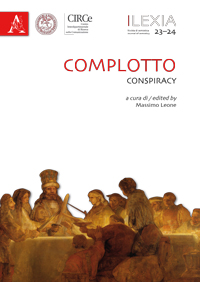Estratto da
LEXIA. RIVISTA DI SEMIOTICA
Complotto
Upsetting National Events and Conspiracy. Narratives in Contemporary Italian Literature
LEXIA. RIVISTA DI SEMIOTICA
Complotto
Upsetting National Events and Conspiracy. Narratives in Contemporary Italian Literature

In the history of a nation, upsetting events sometimes threaten its identity. Often, conspiracy theories work as counter–narratives contrasting the reassuring official accounts of such shocking happenings. Fictional literature is one of the main channels for the diffusion of conspiracy theories. Starting from such premises, the essay focuses on a corpus of Italian novels written in the last sixty years. They refer to four of the most upsetting moments of Italian national history (Risorgimento, the fall of Fascism, the “lead years”, and the passage from the first to the second Republic). The analysis concentrates on novels by Umberto Eco, Andrea Camilleri, Leonardo Sciascia, Rino Cammilleri, Carlo Alianello, and Luciano Bianciardi. It singles out different types of conspiracy narratives in contemporary Italian literature, each one characterized by peculiar recurrent motifs and characters. The essay, therefore, sets the premises for a semiotic study of conspiracy as literary genre.
| pagine: | 345-366 |
| DOI: | 10.4399/978885489931521 |
| data pubblicazione: | Giugno 2016 |
| editore: | Aracne |








